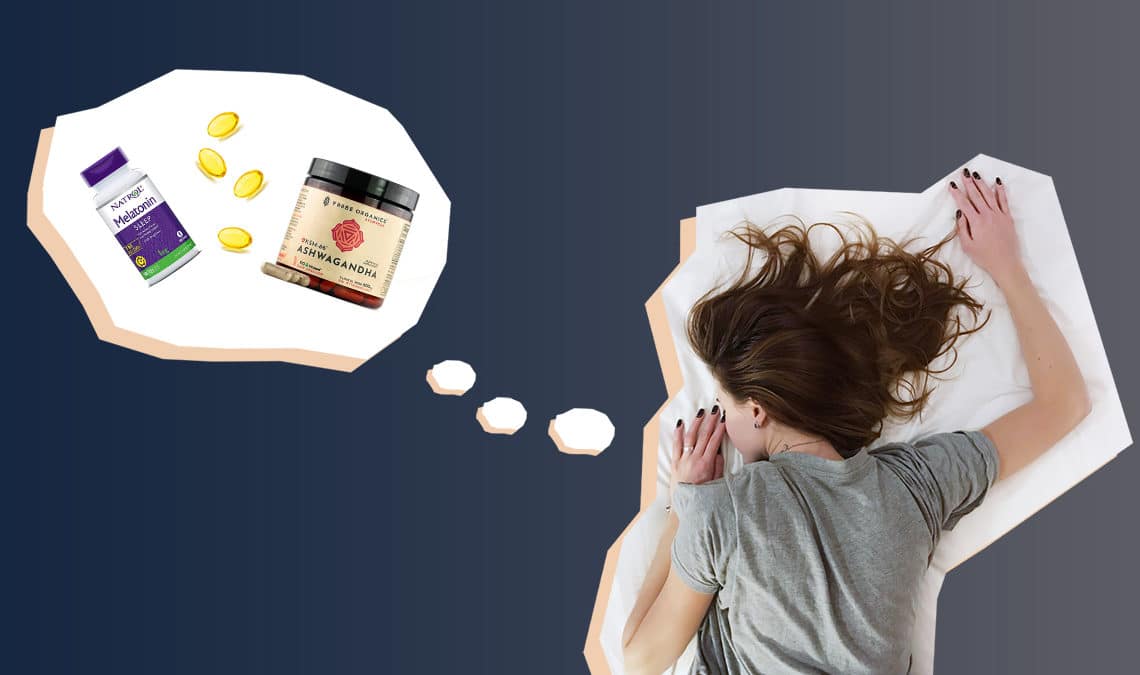
Best CBD For Sleep At A Glance
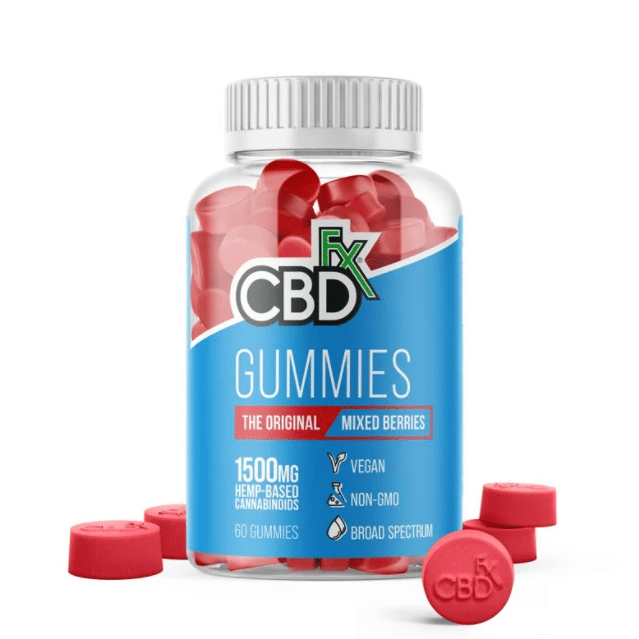
Best CBD Gummies To Stack With
CBDfx CBD Gummy Bears
Each serving of 2 gummies provides 50 mg of CBD along with 60 mg of hemp extract. This is the perfect CBD product to stack with other supplements to build your own CBD sleep stack.
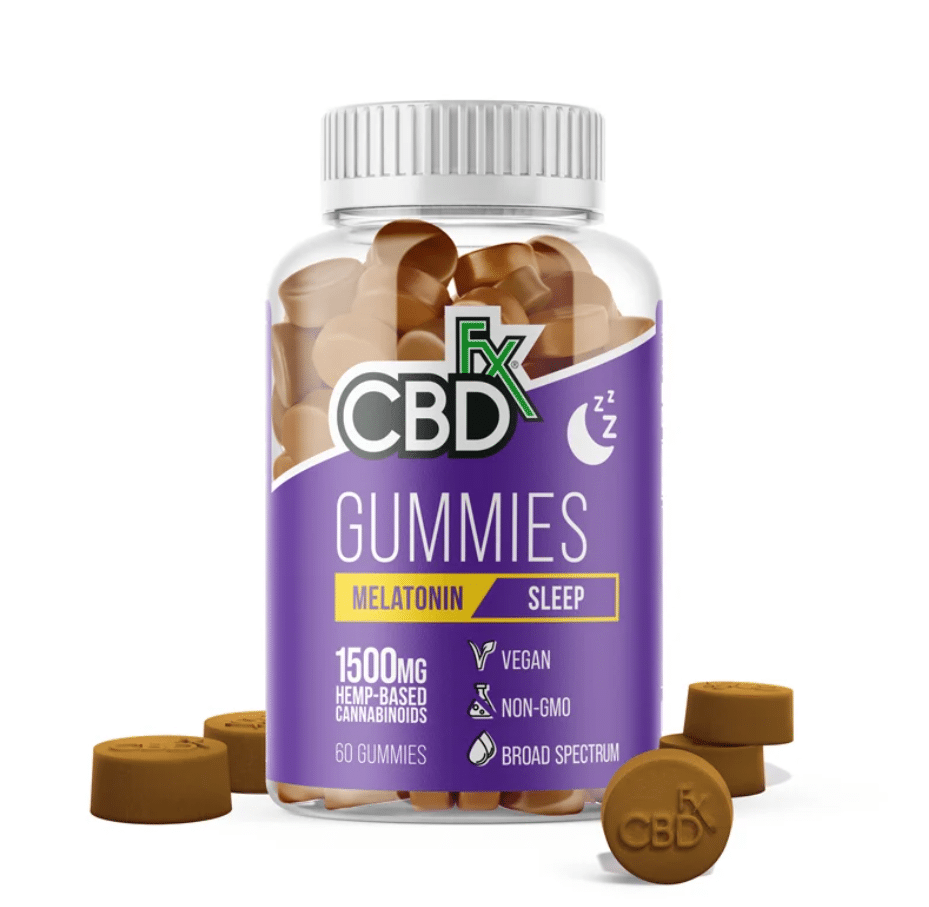
Best CBD Gummies For Sleep
CBDfx CBD Gummies With Melatonin For Sleep
Each serving of 2 gummies provides 50 mg of CBD along with 5 mg of melatonin, 10 mg of a proprietary terpene blend, 20 mg of passion flower extract, 20 mg of chamomile extract, 20 mg of lemon balm extract, and 10 mg of magnesium glycinate.
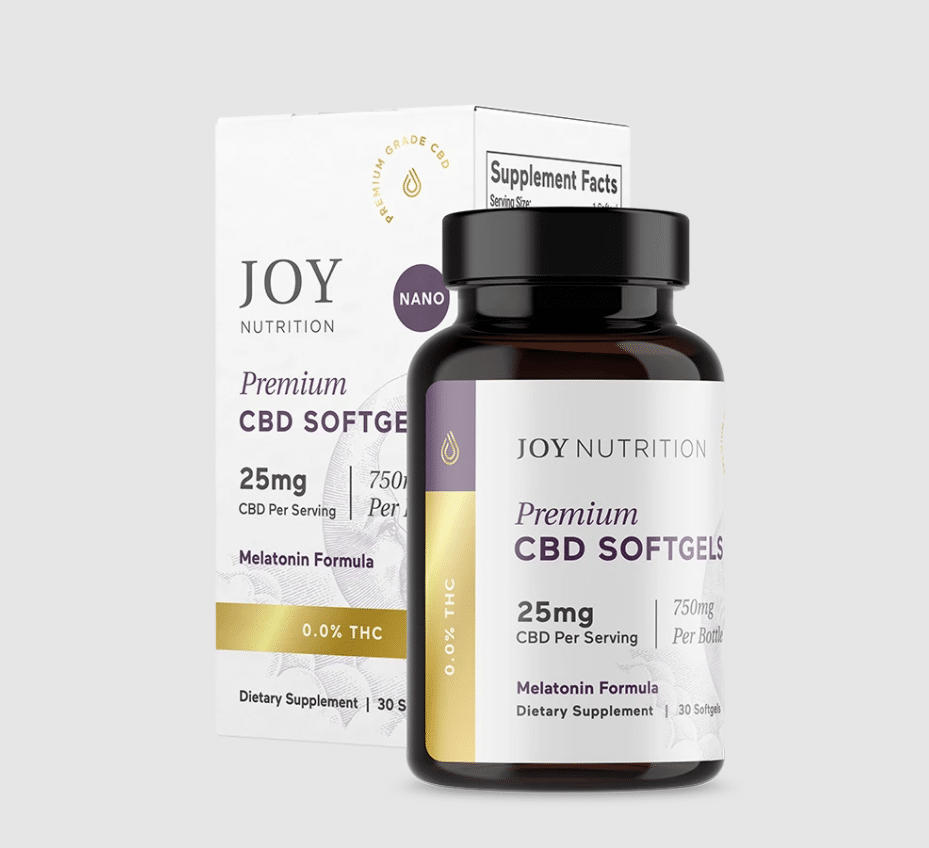
Best CBD Softgels For Sleep
Joy Organics Broad Spectrum CBD Softgels With Melatonin & CBN For Sleep
Joy Organics has combined 3 mg of CBN in this product along with 25 mg of CBD and 3 mg of melatonin in each capsule.
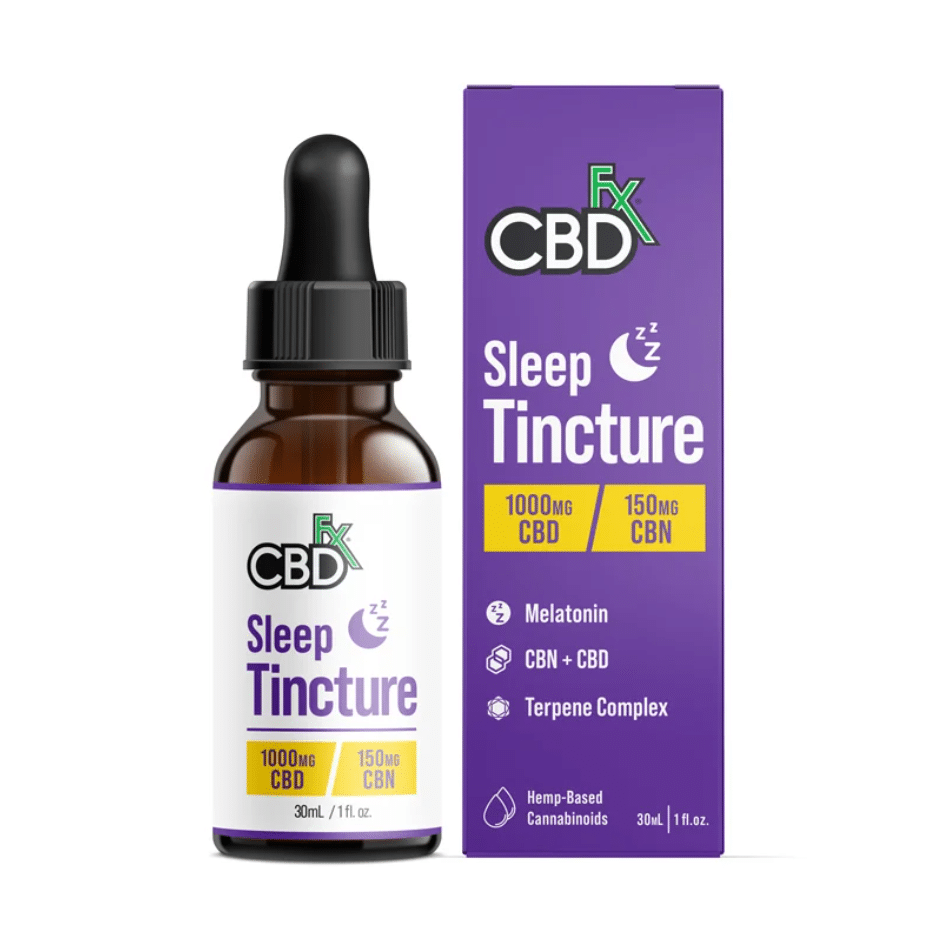
Best CBD Oil Tincture For Sleep
CBDfx CBD Oil Sleep Tincture
This CBD oil sleep tincture provides 33 mg of CBD, 5 mg of CBN, 5 mg of melatonin, and 10 mg of a proprietary terpene complex within each drop.
There are 30 servings available per 30mL container and it is recommended to use this product within 30 to 60 minutes before going to bed.
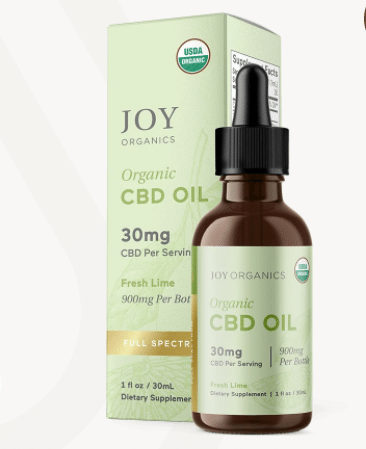
Best CBD To Stack With
Joy Organics Full Spectrum CBD
Joy Organics offers both full-spectrum (less than 0.3% THC) and broad-spectrum (0.0% THC) options for its organic CBD, and many of them are flavored. Each tincture provides between 15-30 mg of CBD per serving.
What’s the best CBD for insomnia? How much CBD for sleep is the right amount? CBD is commonly recommended as a sleep aid, and yet very few CBD companies will bother to explain why it’s effective or how it works. Some provide dosing guides, but even then, they rarely explain where those guidelines are coming from.
So understandably there’s a lot of confusion about why CBD works, or even whether it does. And to make matters worse, a lot of the studies on CBD use doses much higher than people typically use in real life.
Given what we know about the chemical mechanisms behind sleep and CBD, it makes sense to take a multi-pronged approach to supplementing for sleep. That is, instead of buying one CBD oil for insomnia, or other CBD products for sleep, we think it’s more effective to combine CBD with both melatonin and ashwagandha to make a ‘CBD sleep stack’. We believe this will work better for your sleep than CBD, ashwagandha, or melatonin alone. In this review, we explain why, then give you some recommendations for what to buy.
The Various Chemical Pathways Of Sleep
There are many, many chemical pathways involved in sleep, but there are three main ones you need to know about.
Cortisol And Sleep
Cortisol is commonly known as the stress hormone, but that’s a major oversimplification. Cortisol raises alertness and physiological arousal levels and helps to mobilize glucose to fuel activity. It is elevated first thing in the morning–it helps to wake you up–as well as during periods of physical and psychological stress, including exercise.
Accordingly, cortisol is normally low in the evening, and cortisol production is suppressed for at least the first 4 hours of sleep, but begins to rise again toward the end of sleep, in preparation for waking.
As you can guess, having elevated cortisol in the evening–whether due to stress or stimulant use–makes it harder to get to sleep and stay asleep. Furthermore, if you don’t get enough sleep one night, your cortisol levels will remain elevated the next night, and the nightly drop in cortisol will be delayed an hour or more. So sleep deprivation can create a cortisol-driven vicious cycle from which it can take several days to break out.
Melatonin And Sleep
Melatonin is commonly known as the sleep chemical, as it is the one neurotransmitter whose function relates primarily (though by no means entirely) to sleep.
It is produced from serotonin, the brain’s main happiness/relaxation neurotransmitter, which in turn is produced from 5-HTP which is made from the amino acid tryptophan.
Melatonin is the primary neurotransmitter responsible for sleep onset. Accordingly, you need more of it during the early phases of sleep, and even before you go to sleep. That said, it does appear to also play a role in sleep maintenance and quality, at least during the earlier phases of sleep.
Taking a melatonin supplement consistently speeds up sleep onset, with a moderate effect size on average. It also significantly improves sleep quality and total sleep time, but these effects were less consistent and smaller on average.
Cortisol increases serotonin uptake in brain cells. This can be misleading if you don’t know how neurotransmitters work; it doesn’t mean that cortisol increases serotonin production or usage. Quite the opposite in fact! It means that cortisol causes serotonin to be re-absorbed and effectively placed into storage for later, lowering serotonin levels for the time being.
In other words, cortisol prevents relaxation and melatonin production.That said, higher cortisol levels earlier in the day can save your brain’s serotonin stores for later. Again, cortisol isn’t a bad hormone; it’s just bad to have it elevated all the time, especially at night.
GABA And Sleep
Gamma-Aminobutyric acid, or GABA, is the chief inhibitory neurotransmitter in mammalian nervous systems.
GABA enhances the conversion of serotonin into melatonin in rats. This hasn’t yet been demonstrated in humans, but since the chemicals are the same then in principle they should interact the same way.
Accordingly, taking GABA improves sleep latency and sleep efficacy in insomnia patients. However, GABA only crosses the blood-brain barrier in very small quantities, so the patients had to make up for that by taking a very large quantity of it– 300 mg. 10% of patients experienced adverse effects.
Stress also reduces GABA levels, so you can increase GABA production by de-stressing. All things considered, you’d rather do this than take exogenous GABA, because it’s cheaper and less likely to have side effects.
To Recap, Here’s What You Want For Optimal Sleep
- Cortisol levels to be high in the morning, but as low as possible starting 2-3 hours before sleep onset until 1-2 hours before waking
- Serotonin levels to be high for a couple hours before bed and a couple hours after
- Melatonin levels to be high 30 minutes or so before sleep and continuing for 4-5 hours after that
- GABA levels to be high in the evening and throughout the night until shortly before waking
So How Much Does CBD Help With Sleep?
CBD obviously isn’t a naturally-occurring neurotransmitter–so how does it interact with them?
It is well-established at this point that CBD reduces anxiety levels, which in turn aids sleep. Logically you would expect this to be accompanied by a decrease in cortisol levels, although that has not been directly measured.
One study did look at the effect of CBD early in the morning on cortisol. It found that morning CBD delays the natural diurnal reduction in cortisol levels, yet at the same time has a sedative effect. This supports that elevated cortisol is only energizing for a short period, but doesn’t make clear CBD’s effects on evening cortisol levels.
Another exploratory study found that CBD raises GABA levels in neurotypical human brains, but lowers them in people with autistic spectrum disorder.
Marijuana has been found to increase melatonin production in inexperienced users, but the effects in experienced users are more mixed and not entirely positive. The effects of CBD in particular on melatonin have not been directly studied.
However, at least one study has found that CBD increases the production of serotonin, a precursor to melatonin.
In short, some studies have shown that CBD is helpful for supporting healthy sleep, particularly in people with anxiety issues. Mechanistically, CBD likely supports sleep via several chemical pathways, but its effects are probably not very powerful within any given pathway.
In short, CBD is a valuable adjunct to a sleep supplement stack, but not likely to be a silver bullet for better sleep, with the possible exception of some people who have moderate to severe anxiety issues.
Try This CBD-Based Sleep Stack
Given what we know about the chemical mechanisms behind sleep, it makes sense to take a multi-pronged approach to supplementing for sleep.
1. CBD
First, CBD. It reduces stress, increases GABA and serotonin production, and has been shown to improve sleep quality.
Since you want all those benefits to last for hours, it makes the most sense to take CBD in edible form, which will slow absorption and spread out the effect over a longer period of time.
CBD dosages vary widely—most studies use 300-600 mg, but anecdotally, people usually find lower doses to be effective. And since you’ll be combining it with other supplements, you don’t necessarily need a high dosage. Somewhere in the 20-100 mg range is probably what you want; start slow and work your way up.
2. Melatonin
Second, melatonin. It works, it’s safe, it’s cheap, and it’s probably the most effective supplement for sleep induction.
Most melatonin supplements are dosed higher than they need to be though. It only takes .3 mg of melatonin to raise the brain’s melatonin levels to the level required for sleep. Higher doses–.5 mg and above–induce a phase-shift effect, meaning they can move your circadian rhythm forward. That makes higher doses useful for resetting your internal clock to recover from, say, jet lag or a period of sleep disruption. But for daily use, .3 to .5 mg is all you need.
That said, since melatonin also affects sleep quality, there’s an argument to be made for having a slightly higher dosage if it’s in extended-release form.
3. Ashwagandha
Finally, ashwagandha is an excellent adjunct to any sleep stack, but it’s particularly effective for people who find stress getting in the way of their ability to sleep. It also combines perfectly with melatonin and CBD.
Ashwagandha acts as an anxiolytic, decreasing cortisol secretion as well as subjective stress, as well as improving sleep quality. It is sedating at high doses but non-drowsy at lower doses, and appears to act as an adaptogen.
Ashwagandha root extract also mimics the effects of GABA, but without increasing GABA production per se. This means it has great synergy with something that does increase GABA production, like CBD.
Ashwagandha does not directly increase melatonin production. However, as you saw earlier, anything that decreases cortisol and increases GABA (or mimics it, in this case) will enable the brain to produce more melatonin, without forcing it to do so.
The effective dosage for ashwagandha usually ranges from 250 to 650 mg, with the upper half of that range being sedating and only advisable at night. Lower doses, around 50-200 mg, can sometimes be effective at enhancing the effect of other anxiolytics.
As for timing—how to use CBD for sleep—CBD should be taken around two hours before bed if in edible form, or one hour before bed if inhaled. Ashwagandha should be taken one hour before bed, and melatonin a half hour before bed. You don’t need to be precise with these times, but you will get the best results if you follow them at least approximately.
CBD and ashwagandha can also be taken during the day, with food, as non-sedating anxiolytics. In that case you’d want low doses of each—around 10 mg of CBD and 100-200 mg of ashwagandha, twice a day.
Building Your CBD Sleep Stack
To build a full sleep stack, you’ll need one CBD product, one melatonin supplement, and one ashwagandha supplement. Note that because you’re combining multiple supplements, you’re better off starting with low doses of each and working your way up.
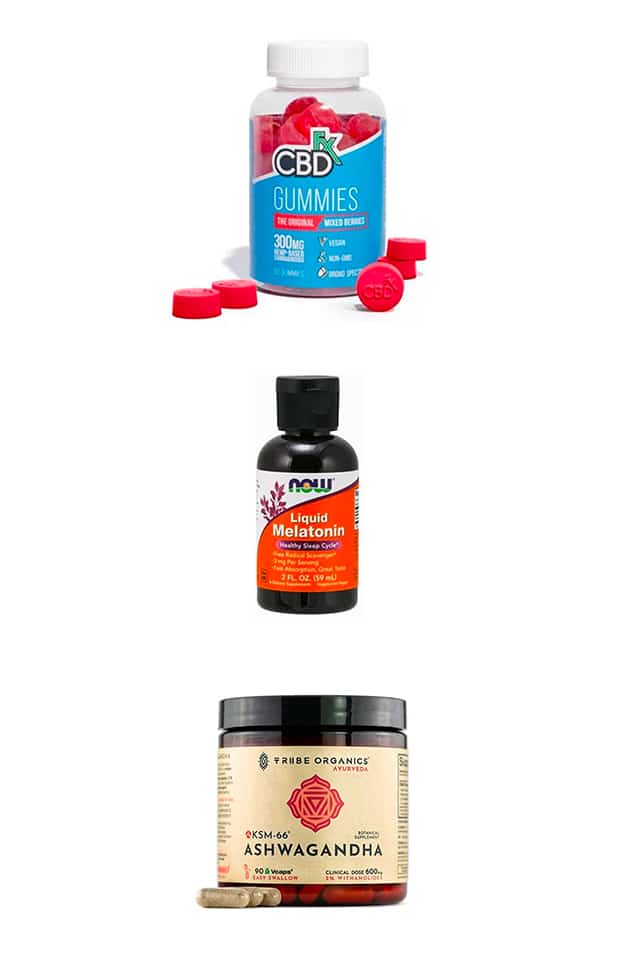
Our CBD Sleep Stack
CBDFx 300 mg CBD Gummies + NOW Liquid Melatonin + Tribe Organics KSM-66 Ashwagandha
Stack allows for optimal dosing with authentic supplements
Our CBD for sleep stack recommendation is:
- CBDFx gummies: these 5 mg gummies are perfect for getting a precise dose of CBD, however much or however little you want
- NOW’s Liquid melatonin: these melatonin drops will, again, allow you to precisely dose according to your nightly needs
- Tribe Organics’ KSM-66 Ashwagandha has authentic ingredients that include withanolides and allow for a perfect dose right before bed—300 mg.
The Best CBD Gummies For Sleep

Best CBD Gummies To Stack With
CBDfx CBD Gummy Bears
Each serving of 2 gummies provides 50 mg of CBD along with 60 mg of hemp extract. This is the perfect CBD product to stack with other supplements to build your own CBD sleep stack.

CBD Gummies With Melatonin And Sleep Terpenes
CBDfx CBD Gummies With Melatonin For Sleep
Each serving of 2 gummies provides 50 mg of CBD along with 5 mg of melatonin, 10 mg of a proprietary terpene blend, 20 mg of passion flower extract, 20 mg of chamomile extract, 20 mg of lemon balm extract, and 10 mg of magnesium glycinate for the ultimate natural sleep remedy.
This product is made with pectin and is vegan-friendly.
It is recommended to take 2 gummies around 30 minutes before going to sleep for best results.
The Best CBN Products For Sleep

CBD Softgels With Melatonin And CBN
Joy Organics Broad Spectrum CBD Softgels With Melatonin & CBN For Sleep
CBN is a cannabinoid that’s well-known for its sleep-promoting benefits and Joy Organics has combined 3 mg of CBN in this product along with 25 mg of CBD and 3 mg of melatonin in each capsule.
These softgels are water-soluble and made with nanoemulsion technology for increased bioavailability.

CBD Oil Tincture With CBN, Melatonin, & Terpene Blend
CBDfx CBD Oil Sleep Tincture
This CBD oil sleep tincture provides 33 mg of CBD, 5 mg of CBN, 5 mg of melatonin, and 10 mg of a proprietary terpene complex within each drop.
There are 30 servings available per 30mL container and it is recommended to use this product within 30 to 60 minutes before going to bed.
Best CBD Oil For Sleep

Best Organic CBD
Joy Organics Full Spectrum CBD Tinctures
CBD (or “cannabidiol”, a non-psychoactive part of the cannabis plant) helps balance the mind-body axis and has anti-anxiety, anti-pain, and anti-depressant properties. Joy Organics offers premium CBD oil tinctures that are made entirely of USDA Certified Organic ingredients.
Joy Organics has both full-spectrum (less than 0.3% THC) and broad-spectrum (0.0% THC) options and many of them are flavored. Each tincture provides between 15-30 mg of CBD per serving.
Best Immediate-Release Melatonin
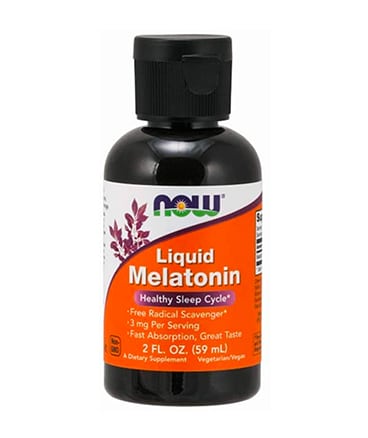
Adjustable dosing
NOW Liquid Melatonin
2 to 3 drops nightly
This liquid form of melatonin allows you to adjust dosages easily and it’s one of the few products that isn’t dosed too high for daily use.
You should take 2-3 drops most nights to get .3-.5 m of melatonin, but you can also take 10-20 drops to reset your circadian rhythm, i.e. when jetlagged
Best Extended-Release Melatonin
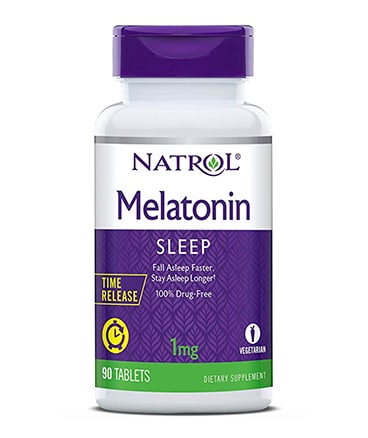
Works throughout the night
Natrol Melatonin
Helps you fall asleep and stay asleep
Each tablet provides 10 mg of vitamin B6 along with 1 mg of melatonin. It is recommended to take 1 tablet 20 minutes before bedtime and this bottle should last you for up to 90 days.
Best Ashwagandha Extract
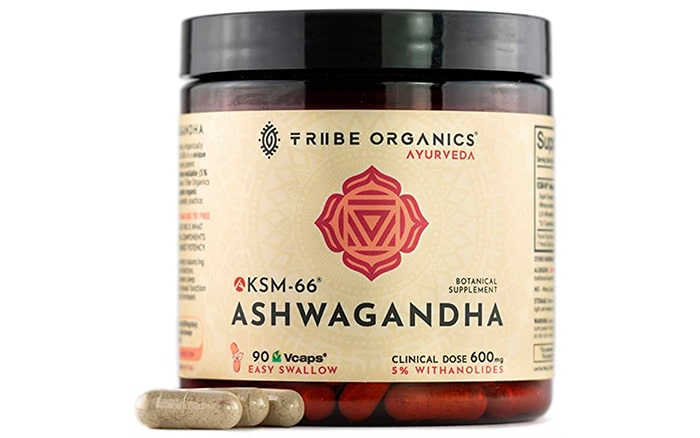
Great value
Tribe Organics Ashwagandha
Uses KSM-66 ashwagandha
Each capsule provides 300 mg of KSM-66 ashwagandha, but it is recommended to take 2 capsules per serving.
300 mg is perfect for use in a sleep stack while 600 mg should be reserved for pre-bed use without CBD, or those with high tolerance or high anxiety.
Best Low-Dose Ashwagandha Extract
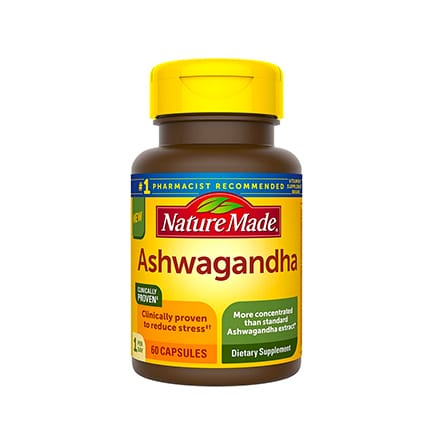
Best low dose
Nature Made Ashwagandha
Combine with high dose of CBD
Each capsule provides 125 mg of Sensoril Ashwagandha, which is standardized to contain 10% withanolides.
This is a great product to start out with if you’re new to using melatonin and want to gradually raise your dose to 250mg+ per day.
Editor’s note: if you want to take your sleep game a bit further, you should start thinking about the effects of blue light on your Circadian rhythm. You might want to consider buying products such as blue light glasses or tinted lightbulbs that help you manage your blue light exposure. To learn more, check out our review of the science behind sleep and blue light.
We discuss CBD and ashwagandha extensively in this review. If if you’re interested in exploring more about these supplements, check out the following: